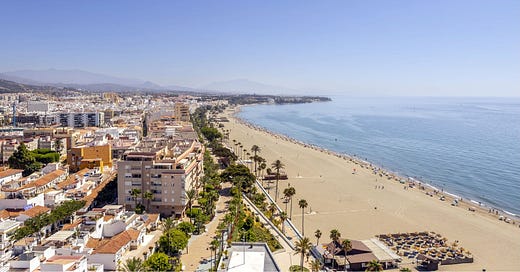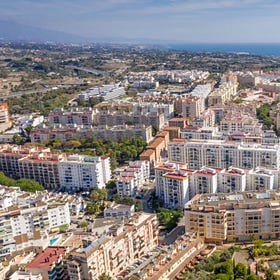Estepona prioritizes local residents for access to subsidized housing
Residents with at least three years of registration in the municipal census will have preference in the allocation of subsidized housing
The Estepona City Council has initiated procedures to modify the Municipal Regulatory Ordinance for the Public Registry of Subsidized Housing Applicants, giving priority to citizens who have been registered in the municipal census for a minimum of three years. This measure, which was announced by Mayor José María García Urbano at the August council meeting, seeks to guarantee access to subsidized housing for long-term residents in a context of growing real estate demand on the Costa del Sol.
The modification of the ordinance, whose draft has already been released for public consultation, represents a significant change from the regulations approved in September 2012. The Estepona council establishes a new selection criterion that will directly benefit those who can prove an administrative residence equal to or greater than three years at the time of submitting their application to access Officially Protected Housing (VPO).
A Response to Real Estate Pressure
The Costa del Sol, and particularly Estepona, has experienced considerable real estate pressure in recent years, making access to housing difficult for local residents. The increase in prices, both for purchase and rent, has caused many Estepona residents, especially young people and families with limited resources, to encounter serious difficulties in finding affordable housing in their own municipality.
This measure aims to correct this situation by prioritizing those who have established their residence in the town on a stable basis over applicants from other origins. Among those registered who meet the census requirement, the seniority of registration in the applicant registry will be applied as an additional criterion.
"We want to ensure that Estepona residents can continue to live in their city," Mayor García Urbano reportedly stated during the presentation of the initiative at the municipal council meeting.
Adaptation to Andalusian Legislation
With this modification, the Estepona City Council adapts its municipal regulations to Law 1/2010, which regulates the Right to Housing in Andalusia and establishes the legal framework for subsidized housing policies in the autonomous community.
The initiative is part of a broader strategy by the council to address housing issues in the municipality, especially aimed at vulnerable groups and those with difficulties accessing the free real estate market.
Comprehensive Plan to Increase Subsidized Housing Stock
Parallel to the modification of the ordinance, the City Council has implemented other complementary measures to increase the supply of subsidized housing in the municipality. The municipal Council approved various initiatives aimed at expediting subsidized housing projects in last March's session.
One of the most prominent measures consists of reclassifying plots that currently have public facility designation in the General Urban Development Plan (PGOU) to allocate them for the construction of subsidized rental housing.
This action is based on the recent Decree-Law 1/2025, of February 24, approved by the Andalusian Regional Government, which contemplates the possibility of building public rental housing on public facility plots without the need to modify planning instruments, provided that these lands do not have a specific use or are classified with the generic use of public and social interest, excluding those reserved for healthcare or educational use.
Inventory of Available Plots
The Municipal Technical Services are currently conducting a detailed study and inventory to identify the most suitable plots that, in accordance with the new regional legislation and the municipal PGOU, can be reclassified for residential use, either as subsidized housing or public housing facilities.
These plots will mainly be allocated to rental housing or other forms of temporary occupation of a rotational nature, with the aim of addressing temporary housing needs for groups with special difficulties in accessing housing, such as young people looking for their first home, single-parent families, elderly people with limited resources, or families affected by evictions.
Estepona to Allocate Public Equipment Parcels for the Construction of Protected Rental Housing
Estepona continues to advance the construction of protected housing for the most vulnerable people in the municipality. Through an agreement that will be carried out at the March municipal plenary session, the Town Hall will begin transforming public equipment parcels
A Problem Affecting the Entire Costa del Sol
The problem of access to housing is not exclusive to Estepona but affects most municipalities on the Costa del Sol. The boom in tourism and the attraction of foreign investors have caused a significant increase in real estate prices, making it difficult for the local population to compete on equal terms in the market.
According to real estate sector data, the average price of housing in Estepona has increased by more than 30% in the last five years, placing it well above the provincial and regional average. This upward trend has made access to housing one of the main concerns for Estepona residents.
In this context, the municipal initiative represents an attempt to balance tourism development and foreign investment with the housing needs of the local population, especially those sectors with fewer economic resources.
Following the release of the draft modification of the ordinance for public consultation, a period opens for citizens and interested entities to submit suggestions and objections. Once this process is completed, the City Council will proceed with the final approval of the new regulations at an upcoming municipal council meeting.
It is expected that the modification will be definitively approved in the coming months, at which point the new preference criterion for registered residents in the allocation of subsidized housing will begin to be applied.
Those interested in accessing subsidized housing must be registered in the Estepona Municipal Public Registry of Subsidized Housing Applicants, meeting the general requirements established by regional regulations on subsidized housing, mainly related to income levels and absence of properties.
Citizen Response and Opposition Stance
The measure has been received with satisfaction by numerous residents of the municipality, especially those who have been trying to access affordable housing for years without success due to the escalation of prices in the free market.
Neighborhood associations and social groups in Estepona have positively valued the initiative, although some consider that it should be accompanied by other complementary measures to significantly increase the stock of subsidized housing in the municipality.
For its part, the municipal opposition, led by the socialist group, has stated that these measures are insufficient given the magnitude of the housing problem in Estepona. In the last municipal council meeting, Emma Molina, spokesperson for the PSOE, made a statement requesting more forceful actions:
"We believe this is an urgent matter because it greatly concerns not only the residents of Estepona, but it is something that is in the news every day, the housing problem that this city has and that not only Estepona has," Molina stated during her intervention.
The socialist representative proposed "the development and construction of one thousand subsidized homes for rent and purchase on public land" and that this project "be carried out through the municipal housing company, reactivating that municipal company and requesting collaboration from other supramunicipal institutions."
Molina emphasized the urgency of approving this proposal "because it is one of the main concerns of Estepona residents" and defended the need to reach an institutional consensus to address the housing problem in a comprehensive manner.
According to sources from the socialist municipal group, their proposal aims to complement the measures announced by the government team, considering that the housing problem requires more ambitious and far-reaching solutions than those proposed so far by the council.
Commitment to Subsidized Housing
The Estepona City Council reaffirms with these measures its commitment to housing access for all citizens of the municipality, especially those with greater economic difficulties.
"Our goal is that no Estepona resident is forced to leave their city because they cannot access decent and affordable housing," Mayor García Urbano reportedly highlighted, emphasizing the importance of this municipal policy in preserving the social fabric and local identity in the face of real estate market pressures.
With these initiatives, Estepona positions itself as one of the most committed municipalities on the Costa del Sol to subsidized housing, taking a step forward in solving one of the main problems currently affecting the citizens of the town.






